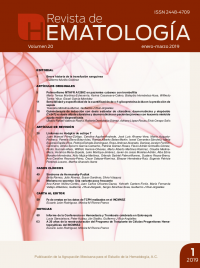Rev Hematol Mex. 2019 enero-marzo;20(1):5-10.
María Teresa Martínez-Echevarría,1 Karina Casanueva-Calero1, Bisleybis Hernández-Acea,1 Wilfredo Torres-Yibar,2 Gissel García-Menédez1
1 Laboratorio de Genética Molecular.
2 Servicio de Hematología.
Hospital Clínico Quirúrgico Hermanos Ameijeiras, La Habana. Cuba.
Resumen
ANTECEDENTES: La hiperhomocisteinemia causada por el polimorfismo A1298C en la enzima metilentetrahidrofolato reductasa puede estar relacionada con eventos trombóticos, aunque aún no existe un acuerdo en relación con su papel en la patogénesis de la trombosis. La frecuencia del polimorfismo MTHFR A1298C varía notablemente en cada población.
OBJETIVO: Evaluar, por primera vez, el comportamiento de la frecuencia del polimorfismo MTHFR A1298C en un grupo de pacientes cubanos jóvenes con antecedente de al menos un evento trombótico.
MATERIAL Y MÉTODO: Estudio descriptivo transversal, efectuado de enero de 2017 a enero de 2018, que incluyó a pacientes menores de 50 años, de uno y otro sexo, provenientes de la consulta de Hematología del Hospital Clínico Quirúrgico Hermanos Ameijeiras, La Habana, Cuba. La detección del polimorfismo MTHFR A1298C se realizó mediante el estuche comercial Lightmix® in vitro diagnostics MTHFR A1298C.
RESULTADOS: De 152 individuos estudiados, 93 (61.2%) tenían el genotipo normal y 59 (38.8%) tuvieron la mutación. De estos últimos 49 (32.2%) fueron heterocigóticos y 10 (6.6%) homocigóticos. No encontramos diferencias estadísticamente significativas asociadas con el género, el color de la piel y el diagnóstico clínico.
CONCLUSIONES: La frecuencia del polimorfismo MTHFR A1298C es baja entre los adultos jóvenes con trombofilia y, entre los portadores, predominan los heterocigóticos. No se encontró asociación entre el polimorfismo MTHFR A1298C y la trombosis, ni entre el polimorfismo MTHFR A1298C y el aborto espontáneo.
PALABRAS CLAVE: Hiperhomocisteinemia; trombofilia; metilentetrahidrofolato reductasa; polimorfismo.
Abstract
BACKGROUND: The hyperhomocysteinemia caused by the A1298C polymorphism in the enzyme methylenetetrahydrofolate reductase is related to the development of thrombotic events although there is still no agreement regarding its role in the pathogenesis of thrombosis. The frequency of the MTHFR A1298C polymorphism varies markedly for each population.
OBJECTIVE: To evaluate, for the first time, the behavior of the MTHFR A1298C polymorphism frequency in a group of young Cuban patients with a history of at least one thrombotic event.
MATERIAL AND METHOD: A descriptive cross-sectional study was carried out from January 2017 to January 2018, which included patients younger than 50 years, of both sexes, from the Hematology clinic of the Hermanos Ameijeiras Hospital, La Habana, Cuba. Detection of the MTHFR A1298C polymorphism was carried out using the Lightmix®in-vitro diagnostics commercial kit MTHFR A1298C.
RESULTS: From 152 studied subjects 93 (61.2%) had the normal genotype and 59 (38.8%) had the mutation. Of these last 49 (32.2%) were heterozygous and 10 (6.6%) were homozygous. We did not find statistically significant differences associated with gender, skin color and clinical diagnostics.
CONCLUSIONS: The frequency of the MTHFR A1298C polymorphism is low among young Cuban adults with thrombophilia and, among carriers, heterozygotes predominate. No association was found between MTHFR A1298C polymorphism and thrombosis and between MTHFR A1298C polymorphism and miscarriage.
KEYWORDS: Hyperhomocysteinemia; Thrombophilia; Methylenetetrahydrofolate reductase; Polymorphism.

